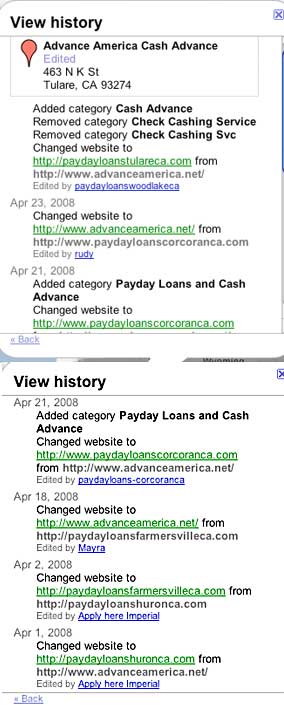Understanding Google My Business & Local Search
Google Maps – User edit abuses happening to Payday loan company?
 I have little sympathy for even the best companies in the payday loan business. Many of them charge as much as 400% interest (as reported in the WSJ) and manage to illegally get their hands on limited Social Security payments (again according to the WSJ), a practice the government is attempting to limit.
I have little sympathy for even the best companies in the payday loan business. Many of them charge as much as 400% interest (as reported in the WSJ) and manage to illegally get their hands on limited Social Security payments (again according to the WSJ), a practice the government is attempting to limit.
Google seems to offer some implicit support for these less than savory tactics of this industry by not having removed their mapspam that I reported at here and at SearchnEngineland.
It appears that in an industry that is used to preying on people is now preying on itself. Advance America is a legitimate (I say that advisedly as there are reports of them charging close to 400% interest) payday loan company that is listed on the NY Stock Exchange and has 2800 bricks and mortar locations. Their local Map’s listings, which they have never claimed, are apparently being hijacked in an effort to claim an affiliate fee.
The search in Google Maps for payday site:advanceamerica.net returns 1941 listings for Advance America, a reasonable approximation of their listings in Google Maps. A little digging into the “View History” of the edited records details a veritable tug of war in a number of the records with a company that varies its domain based on the location but appears to have no role in the process other than an affiliate referral role.
I find it ironic that the sharks of the loan industry seem to be eating each other’s lunch and appear engaged in abuse of the Google End User edit facilities in Maps that was introduced in mid March.
If Google is relying on community policing to keep these kind of practices under control, the system will self destruct. The folks using these services don’t much care and it appears that the aggrieved party doesn’t have a very sophisticated practice in regards to local. These types of edits should automatically trigger some sort of Google review.
© Copyright 2026 - MIKE BLUMENTHAL, ALL RIGHT RESERVED.



Comments
13 Comments
Ah yes, allowing users to manipulate listings in some cases can lead to inmates running the asylum! My guess is that the Local department is just understaffed, at least at the moment, to review all of these kinds of cases?
Hi David
Yes there does seem to be a staffing shortage. But this seems to me to be a coding shortage, no?
You would think that a technical solution be able to at least put these sorts of things on ice.
Mike
Potentially a coding shortage, but even if a code could put a “freeze” on listing edits, wouldn’t a human need to review that listing at some point to know who the rightful owner should be?
Ultimately I suppose yes but even a switch that prevented further editing if more than X number of edits occurred in a certain time would slow it way down and leave only the most abused records for human oversight.
Mike
While all of the search engines are undoubtedly understaffed at their local properties, the question of how to police their systems is one that should have been better addressed prior to making updates to the editing capabilities of users. And for that matter, prior to implementing local listings so prominently in the search results. But since it’s unlikely to change, I think the most productive effort we can make as marketers is to educate and protect our clients and to provide the search engines with sensible solutions.
Mike, I like your suggestion of imposing a limit on the number of edits made to a listing during a certain time frame. I also thought a previous suggestion of yours (enable an email alert every time a claimed listing is changed) was a good one. I would also like to see Google mail a notice to each business whose listing is edited for the first time with a pin number and instructions on claiming their listing.
I agree with your sentiments wholeheartedly. At times though given Google’s and other’s lack of communication even protecting our clients is hard.
Another low hanging fruit wold be to more aggressively monitor those industries with internet affiliate programs that provide incentives for devious behavior…like the hotels (your example), loans, etc.
I know I have mentioned it before but Ahmed Farooq has a great piece on fighting spam in the local world that offers a reasonable set of guidelines.
Mike
Google has more than enough ‘brains’ to figure out dubious behavior.
Yes Ahmed that is for sure.
They don’t really need suggestions from us, they do have enough smarts to get their hands around the problem. But the suggestions highlight the lack of even simple procedures that Google should/could/can implement, no?
So in the end it comes back to why haven’t they? and When will they? and if not, then why not? Always hard for me to understand doing it half way.
Mike
Exactly, Mike. I’m not suggesting that we do their job for them, but it’s certainly more constructive if we offer solutions, which in many cases seem quite obvious.
[…] community edit hijackings started in the Payday Loan industries to create location confusion, moved onto theft in the floral […]
Ultimately I suppose yes but even a switch that prevented further editing if more than X number of edits occurred in a certain time would slow it way down and leave only the most abused records for human oversight.
[…] is certainly not a first for Maps nor a first in this particular industry. This exact behavior was first reported in May of 2008 in the Payday loan industry shortly after Google introduced community edits for […]
[…] became the industry standard. While it has always been unnerving and has lead to criminal activity, abuses and horrendous spam, it was never totally clear whether allowing unverified edits lead to a net […]
Comments for this post are closed.